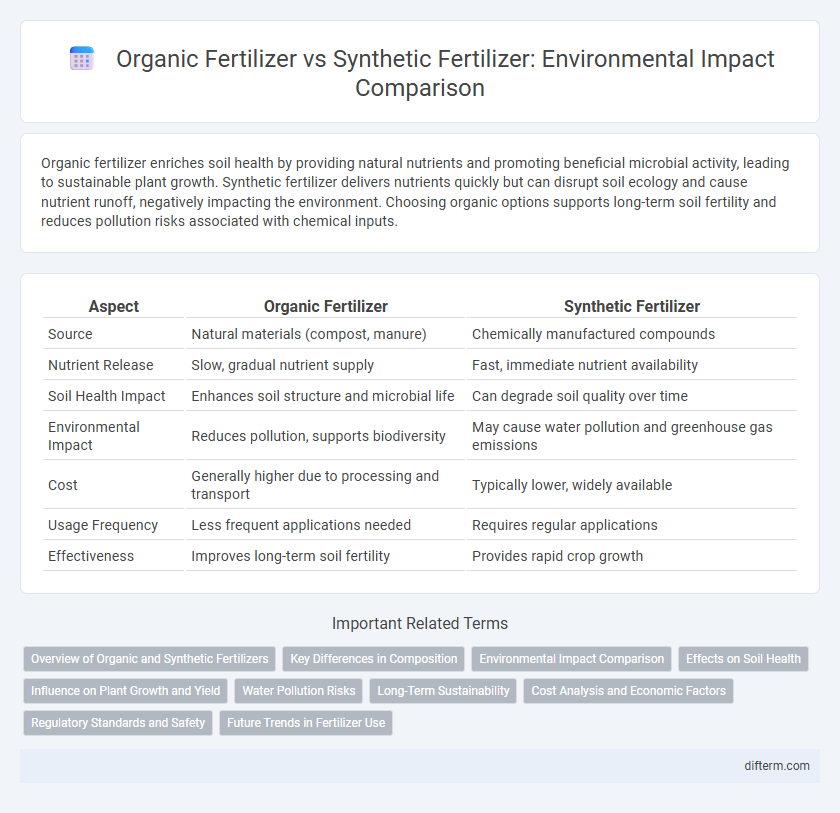Organic fertilizer enriches soil health by providing natural nutrients and promoting beneficial microbial activity, leading to sustainable plant growth. Synthetic fertilizer delivers nutrients quickly but can disrupt soil ecology and cause nutrient runoff, negatively impacting the environment. Choosing organic options supports long-term soil fertility and reduces pollution risks associated with chemical inputs.
Table of Comparison
| Aspect | Organic Fertilizer | Synthetic Fertilizer |
|---|---|---|
| Source | Natural materials (compost, manure) | Chemically manufactured compounds |
| Nutrient Release | Slow, gradual nutrient supply | Fast, immediate nutrient availability |
| Soil Health Impact | Enhances soil structure and microbial life | Can degrade soil quality over time |
| Environmental Impact | Reduces pollution, supports biodiversity | May cause water pollution and greenhouse gas emissions |
| Cost | Generally higher due to processing and transport | Typically lower, widely available |
| Usage Frequency | Less frequent applications needed | Requires regular applications |
| Effectiveness | Improves long-term soil fertility | Provides rapid crop growth |
Overview of Organic and Synthetic Fertilizers
Organic fertilizers derive from natural sources such as compost, manure, and plant residues, enhancing soil health by improving microbial activity and nutrient retention. Synthetic fertilizers consist of chemically synthesized compounds designed to deliver specific nutrients quickly, often leading to rapid plant growth but potentially causing soil degradation over time. The choice between organic and synthetic fertilizers impacts soil biodiversity, nutrient cycling, and long-term agricultural sustainability.
Key Differences in Composition
Organic fertilizer contains natural materials like compost, manure, and bone meal, providing a slow release of nutrients and improving soil structure with increased microbial activity. Synthetic fertilizer consists of chemically manufactured compounds offering concentrated nutrients such as nitrogen, phosphorus, and potassium in precise ratios for rapid plant uptake. The organic option enhances long-term soil health, while synthetic fertilizers deliver immediate, targeted nutrient availability but may risk soil degradation over time.
Environmental Impact Comparison
Organic fertilizers improve soil health by enhancing microbial activity and increasing nutrient retention, reducing the risk of water pollution and greenhouse gas emissions. Synthetic fertilizers often lead to nutrient leaching, contaminating waterways with nitrates and phosphates, and contribute to soil degradation and increased carbon footprint. Choosing organic fertilizers supports sustainable agriculture and mitigates environmental damage compared to the extensive ecological risks associated with synthetic alternatives.
Effects on Soil Health
Organic fertilizers enhance soil health by improving microbial activity, increasing nutrient retention, and promoting soil structure through the addition of organic matter. Synthetic fertilizers often lead to nutrient imbalances, reduced microbial diversity, and soil acidification with prolonged use. Sustainable soil management benefits from organic inputs that support long-term fertility and ecosystem resilience.
Influence on Plant Growth and Yield
Organic fertilizer enhances soil structure and microbial activity, promoting healthier root systems and improving nutrient uptake for sustained plant growth. Synthetic fertilizers deliver precise nutrient formulations that can rapidly increase crop yield but may lead to soil degradation and reduced microbial diversity over time. Long-term reliance on organic fertilizers supports sustainable growth and higher resilience in plants, whereas synthetic options often produce immediate yield boosts with potential environmental trade-offs.
Water Pollution Risks
Organic fertilizer reduces water pollution risks by releasing nutrients slowly and enhancing soil structure, which minimizes nutrient runoff into water bodies. Synthetic fertilizers often contribute to higher nitrate and phosphate runoff, leading to eutrophication and harmful algal blooms in freshwater ecosystems. Proper management of both fertilizer types is essential to protect water quality and aquatic biodiversity.
Long-Term Sustainability
Organic fertilizers enhance soil health by improving microbial activity and nutrient retention, promoting long-term sustainability in agricultural ecosystems. Synthetic fertilizers often lead to soil degradation, reduced biodiversity, and increased risk of nutrient runoff, which can harm surrounding environments over time. Incorporating organic fertilizers supports sustainable farming practices by maintaining soil structure and reducing dependency on chemical inputs.
Cost Analysis and Economic Factors
Organic fertilizers generally incur higher initial costs due to production and transportation expenses but offer long-term savings by improving soil health and reducing the need for chemical inputs. Synthetic fertilizers usually provide a lower upfront price and faster nutrient availability, yet frequent application can increase overall expenses and environmental remediation costs. Economic analysis favors organic fertilizers in sustainable agriculture models where soil productivity and reduced environmental impact lower cumulative operational costs.
Regulatory Standards and Safety
Organic fertilizers must comply with strict regulatory standards focused on environmental safety, including limits on heavy metals and pathogens to protect soil health and water quality. Synthetic fertilizers are regulated to control the concentration of nitrogen, phosphorus, and potassium to prevent nutrient runoff and contamination of water bodies. Both types of fertilizers require compliance with safety guidelines to minimize risks to agricultural workers and ecosystems, but organic options often face more rigorous scrutiny due to natural variability.
Future Trends in Fertilizer Use
Emerging trends indicate a significant shift towards organic fertilizers driven by increased environmental awareness and regulatory pressures limiting synthetic fertilizer use. Innovations in bio-based nutrient formulations and microbial enhancements improve organic fertilizer efficiency, enabling sustainable crop yield without harmful runoff or soil degradation. Precision agriculture technologies integrate real-time soil data to optimize fertilizer application, favoring organic inputs that support long-term soil health and carbon sequestration.
organic fertilizer vs synthetic fertilizer Infographic

 difterm.com
difterm.com